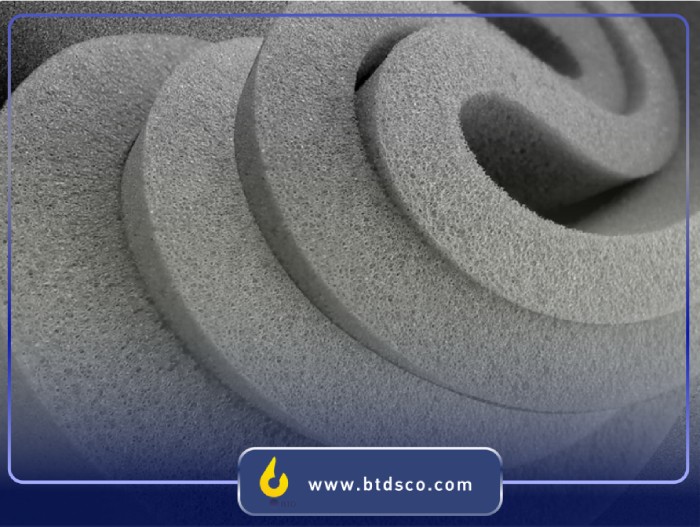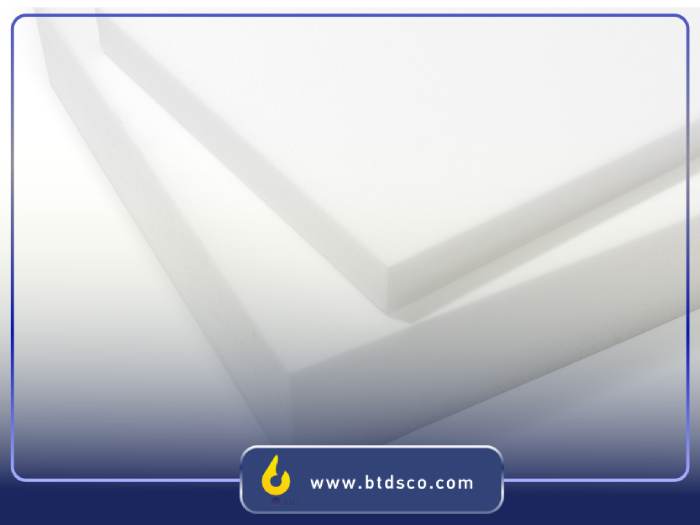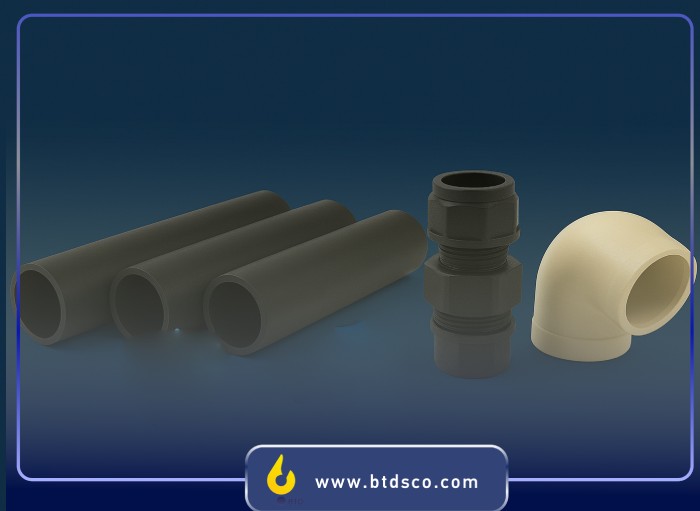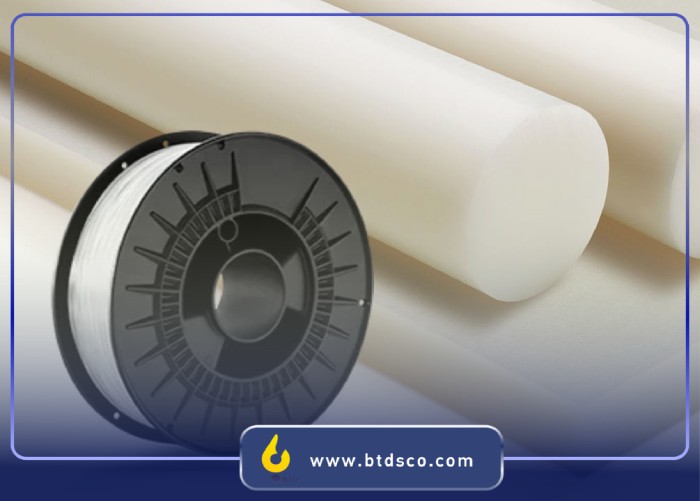Glass Fiber Reinforced Polyamide

Fiber-reinforced polyamides, as one of the advanced polymer materials, have gained a prominent position in various industries. These materials, which combine a polyamide matrix with reinforcing fibers such as glass, carbon, or aramid, offer unique mechanical and chemical properties. Notable characteristics of these polyamides include light weight, high strength, heat and chemical resistance, and durability against wear. As a result, fiber-reinforced polyamides have become a popular choice in industries such as automotive, construction, and aerospace. These materials are widely used in the production of parts that require high strength and low weight, such as vehicle bodies, bridge decks, and helicopter wings.
Among the various grades, polyamide 66 (PA6.6) stands out for its excellent mechanical properties and outstanding thermal resistance, making it the most commonly used grade of fiber-reinforced polyamide. Leading companies, such as Btdsco.com, play a significant role in the production and supply of these materials by utilizing advanced technologies and up-to-date technical knowledge.
Fiber-Reinforced Polyamides
Fiber-reinforced polyamides are a type of composite material in the polymer industry that consists of a polyamide matrix combined with reinforcing fibers. The polyamide matrix forms the main component of the mixture and serves as a binder for the fibers. The reinforcing fibers can be made from materials such as glass, carbon, aramid, or even wood and paper. This combination improves the mechanical and thermal properties of the polyamide, increasing its strength, heat resistance, and durability.
How Fiber-Reinforced Polyamides Are Produced
Fiber-reinforced polyamides are produced by extracting polyamide monomers from sources like petroleum oil. Petroleum oil, as a non-renewable resource, is the most common raw material used for the production of this polymer. In the first stage, the monomers are extracted from crude oil and then converted into polymers through a polymerization process.
The resulting polymer, which forms the primary matrix, is combined with reinforcing fibers such as glass, carbon, aramid, or even materials like wood and paper. This process improves the mechanical and thermal properties of the polyamide, although it is not fully environmentally friendly due to the use of polluting resources.
Features of Fiber-Reinforced Polyamides
Fiber-reinforced polyamides have the following features:
-
Lightweight: The light weight of this material makes it easy to use in various applications.
-
High Structural Strength: It has high resistance to mechanical forces.
-
Impact and Pressure Resistance: It can absorb energy and withstand physical stresses.
-
Electrical and Thermal Insulation: It serves as an insulator against electricity and heat.
-
Chemical Resistance: It resists many acids, bases, and chemicals.
-
Wear Resistance: It is stable against abrasion and physical degradation.
-
Flame Retardant: It has the ability to resist fire and ignition.
-
UV Resistance: It is stable against the harmful effects of ultraviolet radiation.
-
Machinability: It can be easily shaped and processed in industrial applications.
Applications of Fiber-Reinforced Polyamides
Automotive Industry: Fiber-reinforced polyamides, due to their high strength-to-weight ratio, are an ideal substitute for metals in vehicles. This material is used in the production of vehicle bodies, trucks, and trailers. Its light weight improves fuel efficiency while providing higher strength than steel. About one-third of the applications of fiber-reinforced polyamides are in the automotive industry.
Construction Industry: In this industry, over 20% of fiber-reinforced polyamides are used for reconstructing structures and increasing the load capacity of bridges and roads. These materials are also used for producing barriers, safety signs, bridge decks, and gas and water pipelines, helping save costs and increasing the durability of structures.
Aerospace Industry: Fiber-reinforced polyamides, due to their light weight and the ability to produce complex parts, have gained attention in the aerospace industry. This material can reduce the number of component parts by up to 95%, making the production process faster and more cost-effective than steel or aluminum. Today, about 50% of the parts in modern airplanes are made from this polymer, and it is also used in helicopter wings. As the demand for reducing environmental costs grows, the use of this polymer in aerospace is increasing.
Polyamide with Glass Fibers (Fiberglass)
Polyamide with glass fibers (fiberglass) is one of the types of fiber-reinforced polyamides that is reinforced with glass fibers. The production process for glass fibers involves melting a mixture of silica sand, limestone, and folic acid at a temperature of 1260°C. The molten glass is then passed through fine holes in a platinum container, rapidly cooled, and collected as cut fibers. These fibers are woven into various shapes and used in polymer compounds such as polyamides.
Fiberglass fibers, due to their electrical insulation properties, low sensitivity to moisture, and good mechanical properties, are one of the most widely used fibers in fiber-reinforced polyamides. However, their weight is higher than carbon and aramid fibers. This type of polyamide can maintain its performance at temperatures up to 180°C and is widely used in engineering applications due to its mechanical and thermal resistance.
Polyamide 66 with Fibers
Polyamide 66 with fibers (PA6.6) is one of the most commonly used grades of polyamide, known for its hardness, high mechanical resistance, thermal stability, and resistance to decay. This polymer is made from two monomers, hexamethylene diamine and adipic acid, each containing six carbon atoms, hence its name PA6.6. With a density of 3.14 g/cm³ and a melting temperature of 268.8°C, it exhibits high resistance to abrasion, grease, and oil, and can be reinforced with various fibers.
Despite some drawbacks, such as moisture absorption and lower resistance to strong acids and bases, its features like economic pricing and good machinability make it an ideal choice for engineering applications.
Differences Between Various Types of Fiber-Reinforced Polyamides
The main differences between fiber-reinforced polyamides lie in the type of reinforcing fibers used, their weight, mechanical strength, and specific applications. Carbon fibers are the lightest type of fiber and are approximately 75% lighter than steel, 45% lighter than aluminum, and 15% lighter than glass fibers. These fibers are very strong, light, and rigid, making them ideal for products that require weight reduction, such as automotive and aerospace components.
Glass fibers (fiberglass), the most common type in fiber-reinforced polyamides, have good electrical insulation properties and low sensitivity to moisture. They exhibit good mechanical strength and are used in applications where high strength and lower cost are desired. However, they are heavier than carbon and aramid fibers.
Aramid fibers, on the other hand, are lighter than glass fibers and offer very high heat resistance. These fibers are used in applications where low flexibility, high heat, and fire resistance are needed, such as in fire-resistant clothing and safety equipment.
Overall, carbon fiber-reinforced polyamides offer optimized strength and weight, fiberglass is more economical, and aramid fibers provide better thermal resistance.
Advantages of Fiber-Reinforced Polyamides
Fiber-reinforced polyamides offer exceptional properties that make them widely used in many industries. With their light weight and high mechanical strength, they are an ideal substitute for metals in industrial components. Their resistance to heat, wear, and chemicals makes them suitable for harsh conditions. In addition, their electrical and thermal insulation properties, UV resistance, and flame retardancy make them prominent in the production of safe and durable parts. The ability to reinforce with different fibers and ease of machinability further increases their flexibility in designing and producing complex parts.
Disadvantages
Despite the numerous advantages, fiber-reinforced polyamides have limitations, such as moisture absorption, which may affect their mechanical properties. Additionally, these materials have lower chemical resistance to strong acids and bases and may encounter issues if used improperly.
Price of Fiber-Reinforced Polyamides
Several factors influence the price of fiber-reinforced polyamides, including the type of polyamide grade, the percentage of reinforcing fibers, specific properties such as flame retardancy or heat resistance, and the order volume. Additionally, fluctuations in raw material prices, transportation costs, the manufacturer’s brand, and the country of origin also impact the final price. Furthermore, market conditions and demand for these products in industries like automotive, construction, and electronics can cause significant changes in prices. Finally, production and packaging costs may also affect the final price. Therefore, to ensure a cost-effective purchase, it is recommended to stay informed about these factors and request price quotes from reliable suppliers.
Buying Fiber-Reinforced Polyamides
Purchasing from Btdsco.com is an excellent choice for industries due to the company's high-quality products and wide range of fiber-reinforced polyamides. The company sources polymer materials from reputable brands and adheres to international standards, allowing customers to make confident and cost-effective purchases.
In addition to offering products with special features like heat resistance, flame resistance, and wear resistance, Btdsco.com also provides excellent technical consulting and support services. By purchasing from this company, you can benefit from quick delivery and favorable payment terms, making it easier to source the raw materials needed for various industrial projects.
Summary
In conclusion, fiber-reinforced polyamides play a key role in various industries due to their unique properties, such as high resistance, light weight, durability against heat and chemicals, and the ability to be reinforced with different fibers. These materials, especially grades like polyamide 66, serve as an ideal replacement for metals and other traditional materials in industries such as automotive, construction, and aerospace.
However, producing and supplying these materials requires specialized knowledge and advanced technology. In this regard, Btdsco.com, as a leader in the polymer industry and the production of engineering materials, plays a significant role in providing high-quality fiber-reinforced polyamides. By utilizing up-to-date technical knowledge and a commitment to delivering quality products, the company has effectively met the needs of various industries.
If you are looking for products that offer both strength and durability, as well as precision machinability, Btdsco.com is an ideal choice for meeting your needs. The company, with its innovative approach, has taken significant steps to improve the quality and variety of polymer engineering products and is ready to collaborate with customers on various industrial projects.
Recent Articles






